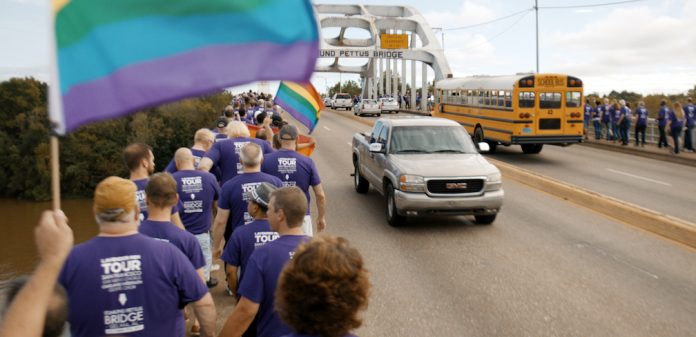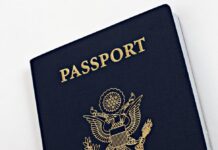[This article appears in the January/February 2020 issue of Boston Spirit magazine. Subscribe for free today.]
Massachusetts is a special place for “Gay Chorus Deep South.”
The award-winning documentary “Gay Chorus Deep South” has screened around the world since its premiere at the 2019 Tribeca Film Festival where it won the Audience Award. But director David Charles Rodrigues, a Massachusetts native, says some of the most memorable screenings have taken place in his home state.
The film, recently acquired by the new MTV Documentary Films, is back in the Bay State on Thursday, February 6, at Tanglewood in Lenox as a collaboration between the Berkshire International Film Festival and Tanglewood Learning Institute; and on Friday, February 7, at Harvard Divinity School.
“Provincetown was one of my favorite [festivals],” says Rodrigues who was born in Lowell and spent his early years in Chelmsford surrounded by his mother’s Greek-American family. At age eight, he moved with his family to his father’s native Brazil. He still has relatives in Massachusetts and many of them made the trip to the Provincetown International Film Festival in June. In October, “Gay Chorus Deep South” was the opening film in the annual GlobeDocs Film Festival. The packed Coolidge Corner Theater was again attended by Rodrigues, and his many relatives from Chelmsford were among the crowd at the Coolidge Corner Theatre.
“‘My Big Fat Greek Wedding’ is a documentary about my family,” says Rodrigues with a laugh.
It’s easy to see why audiences across all spectrums have embraced this film about the healing power of music to at least begin to bridge cultural, racial, political and geographical divides. Rodrigues and his crew followed the San Francisco Gay Men’s Chorus when, in 2016 in response to anti-LGBT laws and the divisiveness 2016 presidential election, it embarked on a tour of the Deep South.
Led by conductor Dr. Tim Seelig who in the film shares the complicated journey that took him from Texas to San Francisco. Seelig was a Southern Baptist minister with a wife and children. When he came out, he was ostracized by his family, church and community. The SFGMC joined with the largely black Oakland Interfaith Gospel Choir which has several LGBT members for the tour. More than 300 singers travelled from Mississippi to Tennessee and through the Carolinas performing, when they were welcomed, in churches, community centers and concert halls. They sang “We Shall Overcome” as they walked over the historic Edmund Pettus bridge in Selma, Alabama. They faced prejudice and some protests but there was also connection, support and visibility for LGBT youth in the South. For members of the choruses like Seelig who still struggled with the pain of rejection, there was some reconciliation with the past.
The positive focus was deliberate from the outset. When Rodrigues, a straight LGBT ally, heard about the SFGMC’s plans to undertake the tour, he immediately wanted to document it. His own life, he says, has been about connecting as a minority with other minorities. “I’m the son of an immigrant and grew up between Brazil and the US, and later lived as a Latino in San Francisco” before moving to Los Angeles where he lives now.
Two other production companies with more resources than he could offer also wanted the job. But Rodrigues, whose background is in advertising and who’s currently working on a docu-series for Netflix, believes the SFGMC chose him to make the film because of his commitment after the 2016 election to “investigate and understand the divisiveness and move forward,” he said. “I believe that we’re closer than what’s being talked about. Conflict is what draws attention in stories but in 2019, hope and positivity is the radical choice.”
As the film crew traveled with the choirs into deep red states, Rodrigues says his beliefs in human connection were reinforced. The performers were turned away at some churches, but what they encountered was “90 percent was positive,” he says. It’s no coincidence that, even in the immediate aftermath of the election, the name of the president is never uttered in the film. “It was about giving the power to the people on the ground, who are living their lives, not to someone locked in a room tweeting,” says Rodrigues. “Minorities must work together and tell each other’s stories. We can’t be divided.”
Besides Seelig’s story, other chorus members highlighted in the film include Ashlé Blow, who wrestles with issues of gender identity while on the tour; and Jimmy White, a Mississippi native fighting cancer who hopes the tour will help him reconnect with his conservative father.
“The day I finished editing, my heart was broken because I would no longer be spending time with this incredible group of people,” Rodrigues says.
The film makes clear that while the LGBT choir members, particularly those who hail from the deep South, reckon with painful pasts, there are many LGBT living among vibrant communities throughout the South who were buoyed by the tour and the performances.
That visibility and outreach continued once the film traveled to screenings and engaged with audiences all over the globe.
For Rodrigues, one of the most touching moments was a post-screening discussion in September in Winston Salem, North Carolina. “A young queer girl who was there with her mother and friends raised her hand and said she had been living in New York and she saw the film at [the Tribeca film festival]. She told me, ‘I was inspired to go home to Winston Salem and join the fight there for the broader community.’”
Not a subscriber? Sign up today for a free subscription to Boston Spirit magazine, New England’s premier LGBT magazine. We will send you a copy of Boston Spirit 6 times per year and we never sell/rent our subscriber information. Click HERE to sign up!










